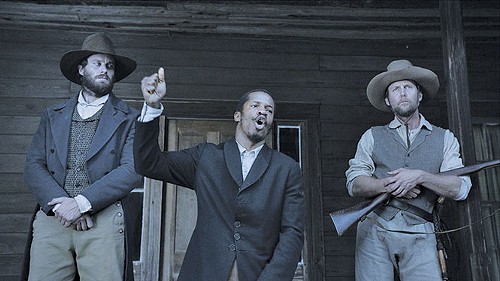New Eyes
The story behind the story inevitably changes how you see The Birth of a Nation.
By Scott Renshaw @scottrenshawImagine the opening scene of an achronological movie narrative, something like Eternal Sunshine of the Spotless Mind. Perhaps it starts with something innocuous, like a conversation between a husband and a wife. Then you learn more about the events leading up to that conversation—an extra-marital affair or a profound loss. And as the movie circles around to showing that original conversation again, the way in which you view it is completely different. The words, the performances, the staging, all are exactly the same. Only the information you bring to that scene has changed.
This is the reality of wrestling with art. This is the reality of wrestling with The Birth of a Nation.
Because between the January premiere of writer/director/star Nate Parker's film at the Sundance Film Festival, and its wide release this week, the story behind the story shifted seismically. What had been the tale of self-financed passion project about incendiary real-life events became more about the events of Parker's own life—his role as defendant (along with Birth's co-story-writer and Parker's friend, Jean Celestin) in a rape case while he was a student at Penn State University. While Parker was found not guilty during the subsequent trial, the details were clearly more complicated than that. Once again, film journalists and average moviegoers were faced with the issue that swirls repeatedly around filmmakers like Woody Allen and Roman Polanski: How do we separate sometimes-repugnant facts and/or allegations around artists' lives from their art? Or, more to the point, should we?
Taken in isolation, there's powerful material in the story of Nat Turner (Parker), the Virginia slave/preacher who eventually led a slave uprising in August 1831, in which several slave-owning families were killed. Parker follows Turner's story from his childhood on the Turner plantation, where he played with the owner's young son Samuel, to adulthood in which Samuel (Armie Hammer) has become Nat's master, occasionally renting Nat out to neighboring farms so he can preach a gospel of accepting their servitude to pre-empt any unrest.
Parker's a more accomplished actor than he is a writer or director, and his performance here effectively captures the shift in Nat's perspective as he witnesses the mistreatment that his Scripture passages are being used to justify. The story structure is clearly meant to build up Nat as a hero figure—up to and including his stoic response to a whipping after daring to baptize a white man—and every music cue and lighting choice emphasizes that mythologizing quality. It might be un-subtle, but it works on a basic dramatic level.
That dramatic punch—even leaving aside on-the-nose moments like using the haunting song "Strange Fruit" while literally showing the hanging bodies of lynched African-Americans—carried my response when I first saw The Birth of a Nation at Sundance in January. But it's harder now to watch some of the specific choices Parker makes to advance his plot. Specifically, he uses two separate assaults on women—slave-hunters attacking Nat's own wife, Cherry (Aja Naomi King), and the wife (Gabrielle Union) of one of Nat's friends (Colman Domingo) being pimped out by Samuel to one of his friends—as motivating incidents spurring Nat and his fellow slaves to action. While Cherry gets at least some opportunity to respond to the fact that she was attacked, the victims of these assaults aren't the victims Parker is most concerned with. He's worried about the men, now turned toward vengeance.
Even more disturbing, however, is the reality that The Birth of a Nation's central thematic idea is crippled by knowledge of Parker's involvement in that rape case. This is fundamentally a narrative about a kind of revolutionary Christianity that sides with the afflicted against those who take advantage of their power to do harm. Nat turns to the idea that there is a moral authority higher than the temporal laws that might help prop up injustice—and when recent interviews with Parker have him focusing on his legal exoneration, rather than moral responsibility, it's hard to take him seriously.
Does it impact my shifting sense of The Birth of a Nation's effectiveness that I'm white? That I'm a man? That I'm a husband and father? It's impossible to know to what extent. But that hypothetical opening scene I described isn't merely hypothetical. The movie might be the same, but I'm not.
More by Scott Renshaw
-
Film Reviews: New Releases for April 12
Civil War, Escape from Germany, Coup de Chance, Hundreds of Beavers, La Chimera, Sting
- Apr 11, 2024
-
University of Utah School of Music premiere of A.L.I.C.E.
Composer connects the Lewis Carroll story to her experience living with autism
- Apr 10, 2024
-
Beavers and Spiders and Thieves, Oh My
Three new films cover a wide range of styles.
- Apr 10, 2024
- More »
Latest in Film Reviews
Readers also liked…
-
Power Plays
Two satirical comedies explore manipulations and self-delusions by those with power.
- Aug 31, 2022




